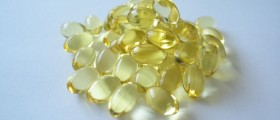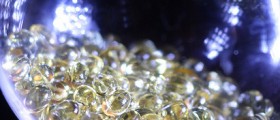
Sources of Vitamin D
Vitamin D is mainly present in foods of animal origin. The richest natural sources of vitamin D are cod liver oil and oils of other fatty fishes such as sardines, salmon and herring. Besides that, good sources of vitamin D are egg yolk, butter and liver, although the amount in them may vary.Dairy products aren’t rich in vitamin D, so they are often enriched with this vitamin. The products of plant origin contain very small amounts of this vitamin, so margarine is often enriched with vitamin D.
Vitamin D content (mg) in 100 g of some food products:Mackerel liver oil 150 000Cod liver 5000-10000Egg yolk (chicken) 8.0Dried alfalfa 5.44Cheese 2.5 to 5.0White mushrooms 2.0 to 6.3beef liver 2.5chicken egg 1.3 to 5Butter 1.34Veal liver 0.53Cow’s milk 0.1Lamb liver - lamb 1.34 An interesting feature of vitamin D, which distinguishes it from other vitamins, is the possibility of its synthesis in the skin from endogenous cholesterol under the influence of UVB rays. Such a method of its production is not inferior by volume and importance to other forms of its "entering" the body. On the contrary, twice a week for up to only half an hour a day sun exposure can provide to the human body a sufficient amount of this vitamin.
There are the limiting factors for its synthesis: geographical location (eg, residents who live north of Boston cannot get sufficient amount of vitamin D from the sun during the winter months), time of the day (optimal period of exposure to UVB rays is between 10h and 15h), air pollution and smog, the amount of melanin in the skin (dark skinned people should be exposed to the sun longer than light skinned people) use of the sun creams with sun protection factor higher than 8 usually block the passage of UVB rays to all skin layers.
Vitamin D Functions in the Human Body
The main role of vitamin D is maintaining the balance of calcium in the body. Its role is to control how much calcium will be absorbed from food, and how much will be available or released from the bone.If the consumed food lacks calcium, the body will take calcium from bones, since they save about 95% of body calcium, and use it for its incorporation into cell membranes and other functions necessary for life. If the body lacks vitamin D, the rganism will not be able to absorb taken calcium, resulting in osteomalacia and osteoporosis in adults and rickets in children.
Vitamin D is also important for the absorption of phosphorus - other important component for bones and teeth development. Lack of calcium and phosphorus can cause a lack of tooth enamel, which subsequently leads to tooth decay.
Recent studies have shown that the Calcitriol affects the beta cells of the pancreas that secrete insulin, so people who lack vitamin D experience disorders in the excretion of insulin.
Vitamin D is applied in the treatment of some forms of cancer because it is demonstrated that Calcitriol affects the growth and differentiation of skin cells and cells important for immunity.
It is also used in the treatment of some autoimmune diseases such as multiple sclerosis, rheumatoid arthritis and diabetes.

















Your thoughts on this
Loading...